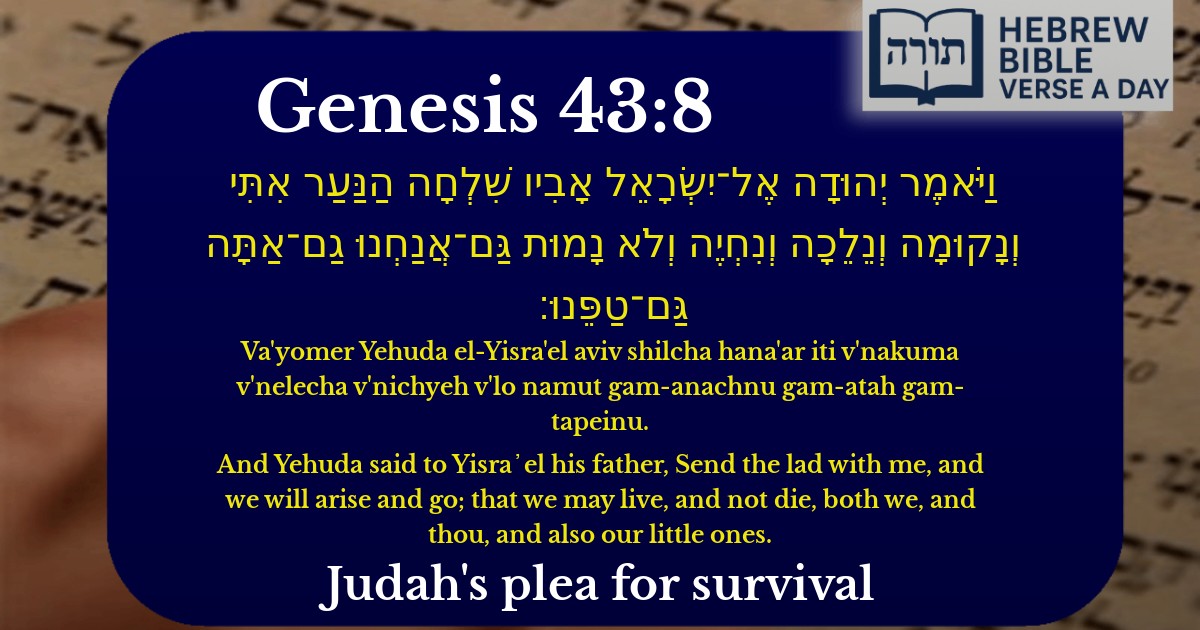Join Our Newsletter To Be Informed When New Videos Are Posted
Join the thousands of fellow Studends who rely on our videos to learn how to read the bible in Hebrew for free!
Hebrew Text
וַיֹּאמֶר יְהוּדָה אֶל־יִשְׂרָאֵל אָבִיו שִׁלְחָה הַנַּעַר אִתִּי וְנָקוּמָה וְנֵלֵכָה וְנִחְיֶה וְלֹא נָמוּת גַּם־אֲנַחְנוּ גַם־אַתָּה גַּם־טַפֵּנוּ׃
English Translation
And Yehuda said to Yisra᾽el his father, Send the lad with me, and we will arise and go; that we may live, and not die, both we, and thou, and also our little ones.
Transliteration
Va'yomer Yehuda el-Yisra'el aviv shilcha hana'ar iti v'nakuma v'nelecha v'nichyeh v'lo namut gam-anachnu gam-atah gam-tapeinu.
Hebrew Leining Text
וַיֹּ֨אמֶר יְהוּדָ֜ה אֶל־יִשְׂרָאֵ֣ל אָבִ֗יו שִׁלְחָ֥ה הַנַּ֛עַר אִתִּ֖י וְנָק֣וּמָה וְנֵלֵ֑כָה וְנִֽחְיֶה֙ וְלֹ֣א נָמ֔וּת גַּם־אֲנַ֥חְנוּ גַם־אַתָּ֖ה גַּם־טַפֵּֽנוּ׃
וַיֹּ֨אמֶר יְהוּדָ֜ה אֶל־יִשְׂרָאֵ֣ל אָבִ֗יו שִׁלְחָ֥ה הַנַּ֛עַר אִתִּ֖י וְנָק֣וּמָה וְנֵלֵ֑כָה וְנִֽחְיֶה֙ וְלֹ֣א נָמ֔וּת גַּם־אֲנַ֥חְנוּ גַם־אַתָּ֖ה גַּם־טַפֵּֽנוּ׃
🎵 Listen to leining
Parasha Commentary
📚 Talmud Citations
This verse is quoted in the Talmud.
📖 Chullin 91b
The verse is referenced in a discussion about the importance of life and the lengths one should go to preserve it, illustrating Judah's argument to his father Israel (Jacob) about sending Benjamin to Egypt.


Context of the Verse
This verse (Bereshit 43:8) appears in the narrative where Yehuda pleads with his father Yaakov (Yisrael) to allow Binyamin to accompany them to Egypt to obtain food during the famine. The brothers had previously been instructed by Yosef (unbeknownst to them) to bring Binyamin as a condition for receiving further provisions.
Yehuda's Argument
Rashi explains that Yehuda presents a logical and emotional appeal to Yaakov, emphasizing that without Binyamin, the entire family—including Yaakov himself and their children—would perish from hunger. The phrase "וְנִחְיֶה וְלֹא נָמוּת" ("that we may live, and not die") underscores the urgency of their situation. Yehuda takes personal responsibility, as seen later in the parsha (Bereshit 43:9), where he guarantees Binyamin's safety.
Spiritual and Practical Implications
Linguistic Nuances
Ibn Ezra observes that Yehuda refers to Binyamin as "הַנַּעַר" ("the lad"), a term of endearment and perhaps an attempt to reassure Yaakov of Binyamin's youth and vulnerability, thereby eliciting his father's compassion. The verb "וְנָקוּמָה" ("and we will arise") suggests urgency and determination, as if to say they must act immediately to avert disaster.